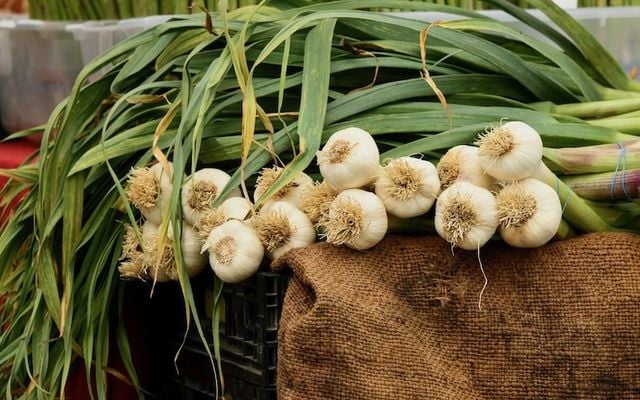Wild garlic can be found in Ireland from April to June. Now is the perfect time to forage for this aromatic herb and use it as part of your home cooking.
Ramsons is the only native garlic that grows in Ireland. Unlike its shop-bought counterpart, wild garlic boasts a fresher, more intense flavor, with subtle variations in taste depending on where it's found.
“Garlic stands as one of the most indispensable ingredients worldwide, its versatility and rich flavor is perfect for adding depth and aromatic flavor to a wide range of dishes. From Mediterranean to Asian cooking, its versatility shines, whether roasted, minced, or sautéed," says Hannah Duxbury, Head of Culinary from Hello Fresh Ireland.
To help level up your garlic game, Hannah and the team at Hello Fresh Ireland have provided some tips to get the most out of cooking with garlic at home.
Garlic-Infused Oil
Garlic-infused oil is a versatile ingredient that can add depth to many dishes.
You can make your own garlic-infused oil by gently heating olive oil in a saucepan over low heat and then adding crushed garlic cloves (about 2-3 cloves per cup of oil). Let them simmer for 5-10 minutes, being careful not to let the garlic brown.
Remove the pan from the heat and allow the oil to cool completely and strain out the garlic cloves and transfer the infused oil to a clean, airtight container. Use garlic-infused oil for sautéing vegetables, drizzling over pizza, or tossing with pasta. Store in the fridge for up to two weeks.
Wild Garlic Pesto
For a nutrient-packed twist on traditional pesto, incorporate wild garlic into your recipe.
Combine 100g of fresh wild garlic leaves with 25g of toasted pine nuts and 50g of grated Parmesan cheese. Add a squeeze of lemon juice for brightness. Blitz in a food processor, gradually drizzling in olive oil until smooth and then season with salt and pepper.
This versatile pesto is great as a spread for sandwiches, a sauce for pasta, or a dip for veggies. Store in an airtight container in the fridge for up to a week, or freeze it in ice cube trays for longer storage.
Roasted Garlic
Roasting garlic tones down its raw flavor and brings out its natural sweetness, giving it a creamy, caramelized quality instead.
To do this, preheat your oven to 200°C and cut the top off a head of garlic to expose the cloves, leaving the bulb intact. Then drizzle with olive oil, sprinkle with salt and pepper, then wrap tightly in tin foil and place on a baking sheet. Roast for 30-40 minutes, or until the cloves are soft and golden brown.
Once cooled, squeeze the roasted cloves out of their skins and use them in mashed potatoes, spread on bread, or stir into sauces for a rich, sweet garlic flavor that adds depth to meals.
Raw vs. Cooked
Raw garlic has a sharp, punchy flavor, while cooked garlic is milder and slightly sweeter.
The punch of raw garlic is perfect for dishes like salad dressings, salsas, or bruschetta where its assertive taste can shine. Whereas, cooked garlic is incredibly versatile, lending its milder, sweeter flavor to a multitude of cuisines. From pasta sauces and soups to stir-fries and roasted meats, its subtle aroma and taste can enhance countless dishes.
Adding at Different Times
Adding garlic at different stages of cooking can significantly impact the flavor profile of your dish.
The timing of adding garlic alters its intensity and character, whether you seek a bold, punchy hit or a subtle, aromatic undertone. When sautéing garlic, it's crucial to monitor the heat and timing to avoid burning, which can result in a bitter taste. Heat oil or butter in a pan over medium heat, then add minced or sliced garlic. Cook for 30 seconds to 1 minute, stirring constantly, until fragrant and just beginning to turn golden.
For dishes like soups, stews, or sauces, adding garlic at the beginning allows it to infuse the entire dish with its flavor as it simmers and melds with other ingredients. Finely minced or crushed garlic added towards the beginning of cooking releases its aroma and flavor gradually, while adding whole cloves towards the end imparts a punchier essence.
Garlic Scape
If you have access to garlic scapes (the curly green shoots that grow from garlic bulbs), you can use them in place of or in addition to wild garlic.
They have a similar flavor profile and can be used in pesto, salads, or stir-fries. They have a milder flavor than garlic cloves but still retain a garlicky taste with a hint of sweetness. When using garlic scapes, trim off any tough or fibrous parts and chop them finely or blend them into sauces or dips for a subtle garlicky flavour.




Comments